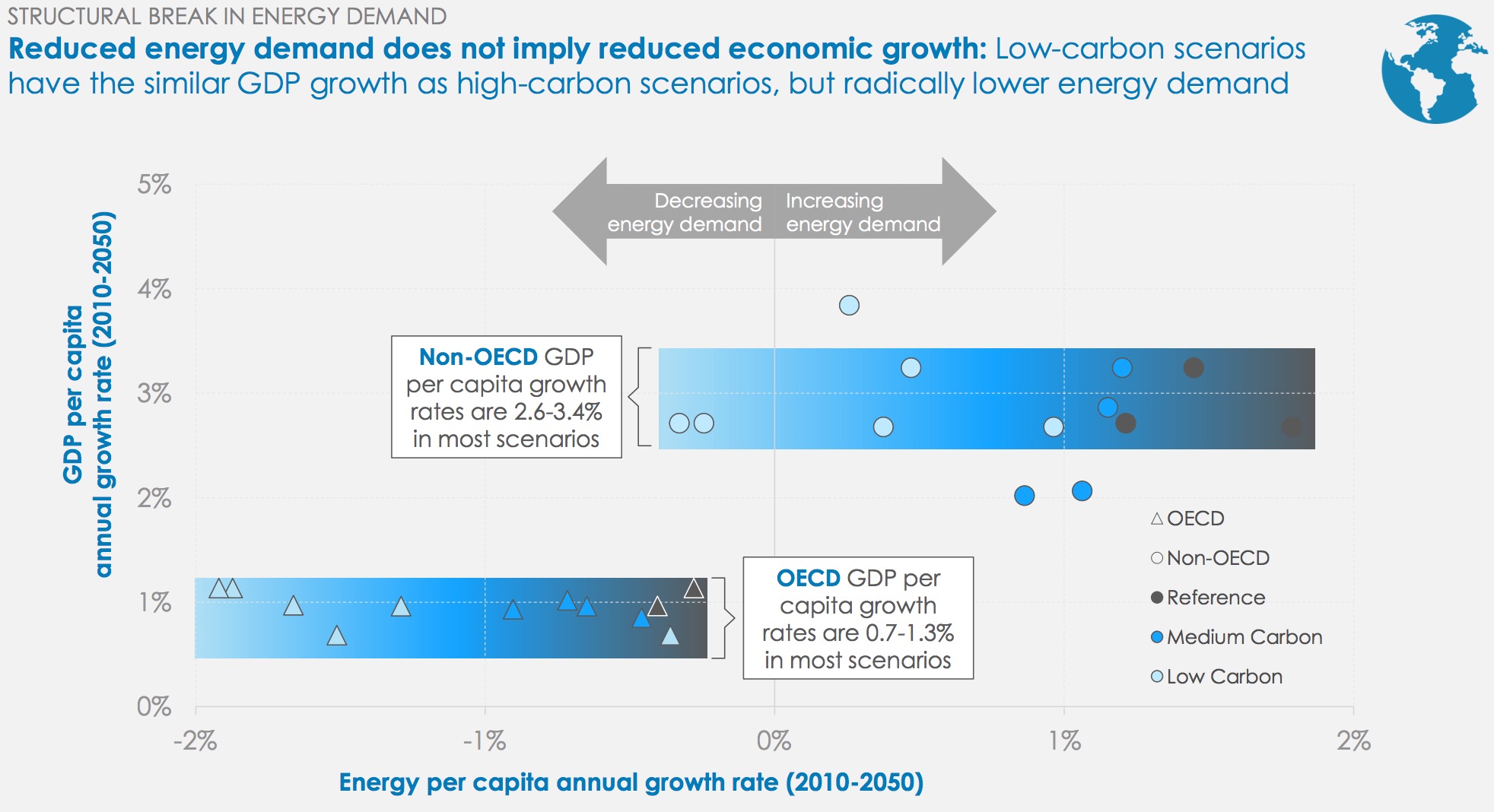ENERGY TRANSITIONS COMMISSION
An analysis of energy demand trends and drivers in low carbon scenarios prepared by Vivid Economics for the Energy Transitions Commission
In the absence of a demand-side energy transition, global energy demand is likely to grow by 60% to 2050 and greater efforts will be required to decarbonise energy supply.
We analysed 15 future energy demand scenarios to understand the extent and character of energy demand reductions that scenario teams believe are required to meet a 2˚C pathway versus “business-as-usual.”
Energy demand scenarios portray a future of continued economic growth.
Regardless of carbon emissions pathway, economic growth is assumed to continue, with average GDP per capita growth rates of 1.2% and 2.3% in OECD and non-OECD economies respectively to 2050. As a result, on average across scenarios:
- OECD economies increase GDP per capita from $38k in 2015 by 25% to 2030 and 60% to 2050;
- Non-OECD economies increase GDP per capita from $10k in 2015 by 50% to 2030 and 150% by 2050; and
- China (~25% of the population of the non-OECD) increases GDP per capita from $13.5k by 100% to 2030 and by 270% to 2050.
Without a demand-side energy transition, continued economic growth will demand ever greater quantities of energy.
In the average of reference scenarios, unconstrained by climate mitigation action, energy per capita increases during 2010-2050 by:
- 13% in OECD economies, reaching 140 GJ/capita;
- 50% in non-OECD economies, reaching 55 GJ/capita; and
- 125% in China, reaching 107 GJ/capita.
In the absence of a demand-side transition, much greater decarbonisation efforts will be required to meet a 2˚C pathway.
With OECD and non-OECD populations reaching, on average, 1.3 and 8 billion respectively in 2050, these per capita increases in energy demand mean that, on average, 60% more exajoules of decarbonised energy supply will be required in 2050 in addition to the decarbonisation of present-day energy supply.
A structural break in energy demand per capita is required to enable continued economic growth and provide energy services for all in a well below 2˚C pathway.
Improving energy productivity1 by 2.5% to 3% per year is essential to enable continued economic growth and provide energy services for all in a low carbon pathway.
- On average, low carbon scenarios exhibit energy productivity improvements of 2.5% per year.
- To achieve a well below 2˚C pathway, energy productivity improvements of at least 3% per year are required when combined with a 1% point per year increase in the share of zero-carbon energy.
- This is significantly higher than the historical average of 1.6% annual energy productivity improvements between 1990 and 2010.
A structural break in levels of energy demand per capita is needed to deliver high levels of energy productivity improvements.
In low carbon scenarios:
- Energy demand per capita halves in OECD economies, when historically it has been relatively constant.
- Non-OECD economies increase GDP per capita by a factor 3-4 with almost no growth in energy demand per capita.
Path dependency calls for immediate, rapid and accelerating improvements in energy productivity.
Only scenarios with early and accelerating reductions in demand growth lead to a 2˚C pathway. Even large demand reductions in later periods are not enough to get scenarios with limited early energy productivity improvements back on a 2˚C pathway.
Energy productivity improvements are as important as decarbonisation of energy supply for climate mitigation.
- These improvements account for 45% of gross carbon emissions reductions, on average, in low carbon scenarios.
- They can serve as insurance: faster energy productivity improvements now create space for higher economic growth and offer some protection against the uncertain delivery of advanced decarbonisation technologies.
Download full version (PDF): Economic growth in a low carbon world
About the Energy Transitions Commission
www.energy-transitions.org
“There is an urgent need to make the right decisions about our energy systems. We are a diverse group from across the energy landscape, aiming to accelerate change towards low-carbon energy systems that enable robust economic development and limit the rise in global temperature to well below 2°C”.
Tags: Economic Growth, Energy Transitions Commission, Global Warming, Growth







 RSS Feed
RSS Feed